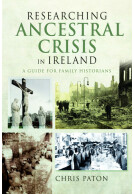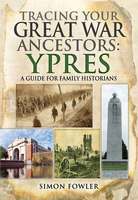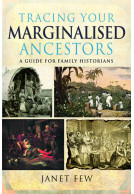Tracing Your Ancestors Through the Equity Courts (eBook)
A Guide for Family and Local Historians
Imprint: Pen & Sword Family History
Series: Tracing Your Ancestors
File Size: 6.1 MB (.epub)
Pages: 211
ISBN: 9781473891685
Published: 30th October 2017
| Other formats available | Price |
|---|---|
| Tracing Your Ancestors Through… Paperback Add to Basket | £14.99 |
The records of the Courts of Equity, which dealt with cases of fairness rather than law, are among the most detailed, extensive and revealing of all the legal documents historians can consult, yet they are often neglected. Susan Moore's expert introduction to them opens up this fascinating source to researchers who may not be familiar with them and dont know how to take advantage of them. As she traces the purpose, history and organization of the Courts of Equity from around 1500 to 1876, she demonstrates how varied their role was and how valuable their archives are for us today. She covers the Courts of Chancery, Exchequer, Star Chamber, Requests, Palatinates and Duchy of Lancaster in clear detail. Her work shows researchers why their records are worth searching, how to search them and how many jewels of information can be found in them. This introduction will be appreciated by local, social and family historians who are coming to these records for the first time and by those who already know of the records but have found them daunting.
As featured in
Family Tree
"Susan Moore achieves exactly what she
Society of Genealogists
set out to do, to prove the usefulness of equity records and to make them accessible by clear exposition and well chosen examples."
As featured in
Susan Moore is one of the leading authorities on this topic. Her new book is not confined to Chancery documents: she also considers the records of Star Chamber, the Court of Requests, the Exchequer court, the Duchy of Lancaster, and the Palatinates of Lancaster, Chester, and Durham. Their record keeping activities were similar – but not identical – to those of Chancery.
Family & Community Historical Research Society
This book is aimed at beginners, and as such is to be recommended to those with no previous experience of working with these documents.
Chancery records are an underutilized record group which can be very valuable for reconstructing families and their characters. This book provides a clear guide into how to access and use these records. It is thus highly recommended for any English/Welsh researcher and all types of genealogical collections.
Paul Milner, Genealogy
A vital comprehensive reference guide to exploring the cases in the Equity Courts records at the TNA. The enlightening wide range of records described and cases outlined are likely to formulate ideas for potential Equity Court research in your own family tree which may prove revealing.
Essex Family History Society
I have recently found the case in the criminal court where my 3x great grandfather, beer shop keeper, gave testimony that a bloke tried to sell him stolen goods. Not a patch on Jarndyce and Jarndyce in the civil courts.
Northumberland & Durham FHS
This exploration of the history of the many equity courts and the variety of countless documents makes for fascinating reading. There are ample examples of material, some lengthy with commentary, which demonstrate the richness of the information that can emerge about the lives and character of those involved. If only we could easily identify the documents relating to our research …..
In this book, Susan Moore removes much of the mystique surrounding the voluminous equity court records, all of which are held at The National Archives, Kew (TNA) and most of which are written in English. Focusing significant attention on the Court of Chancery, she follows a logical path, first whetting the reader’s appetite with an overview of the almost limitless variety of information available, before stepping through the documentation created as an equity suit progressed from initial complaint, to the gathering of evidence and final judgement.
Alde Valley Suffolk Family History Group
For those wishing to bring real colour to the lives of their ancestors and who are willing to invest some time getting to grips with the undeniable complexities of equity court records, Susan Moore’s latest outing offers first class guidance.
This is a much extended and updated version of a previous booklet on the subject by the author. This traces the history of Equity Courts from about 1500 to 1876 and explains their role and the value of their archives for today's researchers.The author explains why these archives are worth searching, how to go about it and the type of information gems that can be discovered.
Bristol & Avon Family History Society
They are among the most detailed, extensive and revealing legal documents that historians can consult. The book covers in detail the Courts of Chancery, Exchange, Star Chamber Requests, Palatinates and Duchy of Lancaster. There is an explanation of how to use the relevant TNA indexes, several sample cases and informative glossary and bibliography.
Read it for: An essential handbook for understanding and using equity court records.
Your Family History, February 2018
The text of this excellent book is very approachable, covering not only the Courts of Chancery, Exchequer, Requests and Star Chamber, but also the oft-forgotten Palatinates of Chester, Durham and Lancaster, and the Duchy of Lancaster.
WDYTYA? January 2018 – reviewed by Paul Blake
Tracing Your Ancestors Through the Equity Courts will not only whet your appetite but provide excellent historical context and advice on why and how to seek them out.
Family Tree, January 2018
About Susan Moore
Since 1974 Susan Moore has spent her working life using the records of the Equity Courts and is one of the foremost authorities on the subject. She has written articles on aspects of the courts for family history magazines, in particular for Who Do You Think You Are? Magazine, and she has lectured to family history societies. Her publications include Family Feuds: An Introduction to Chancery Proceedings.






















